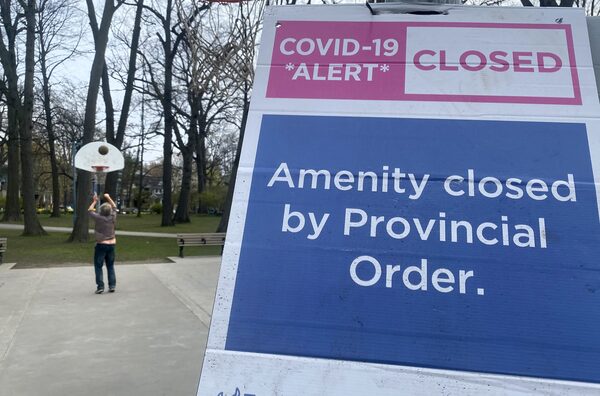
A man shoots baskets alone on an outdoor basketball court in Toronto on May 3, 2021.Frank Gunn/The Canadian Press
Ontario golfers have been pushing the province to reopen courses ordered closed while the province is under stay-at-home orders, but some observers say access to outdoor recreational facilities serving a wider population should be just as high on the agenda.
Doctors and recreational facility administrators say Canadians need access to affordable, inclusive and local ways to get outside and exercise, so long as health care professionals deem it safe.
“Many of the people I care for live in dense apartment buildings, have small indoor spaces and don’t have the luxury of a backyard,” said Dr. Naheed Dosani, a palliative care physician and health justice activist in Toronto.
“We need to really be thinking about how to keep these people physically and mentally healthy.”
Dr. Dosani and others hope the province will make any reopening of recreational opportunities equitable. As well as golf courses, basketball nets, skate parks and tennis courts have remained out of bounds for months.
Golfers and club operators argue the sport is safe since it’s possible to golf while masked and physically distanced, other provinces are currently allowing the sport and people aren’t travelling to play.
“They are looking to play their local golf course in their home community for the physical and mental health break that the sport provides,” Mike Kelly, the executive director of the Golf Association of Ontario, said in May.
Several doctors have even given golf and many other outdoor forms of exercise the green light because the risk of transmitting COVID-19 is low outside.
However, Ontario Premier Doug Ford has been unwilling to budge because the province has routinely reported more than 2,000 new, daily COVID-19 cases and many intensive care units are still overwhelmed.
“I talk to my buddies. I know what happens,” Ford said Thursday. “They pick up another buddy, two or three. They go out, they go golfing … then after golfing, they go back, they have a few pops. That’s the problem.”
Ford said he hopes to reopen outdoor recreational facilities by June 2, but the golf industry is not relenting and some have even reopened in defiance.
Yet many say reopening plans can’t just focus on a sport that comes with pricey fees, often requires a membership and doesn’t always attract youth.
“Given what we’ve learned about this pandemic and how it has had a disproportionate impact on people experiencing poverty and racialized communities, it’s quite disappointing that there’s been such advocacy around a sport like golf,” said Dr. Dosani.
“It probably speaks to who has the loudest voice at times like this, and who has the resources to advocate.”
While it’s important to stay home to stop the spread of COVID-19, that doesn’t mean all physical activity should be curtailed, said ParticipAction, a national non-profit organization dedicated to physical activity.
Walking, hiking, biking, tennis, basketball and just having access to open green space can be safe, said ParticipAction’s Dr. Leigh Vanderloo.
“We’re doing a disservice by prohibiting access to all of these different types of recreational and sporting facilities outdoors,” she said.
The prolonged wait to get back to recreation is particularly tough for marginalized communities or those living in condensed homes with no backyards, she said.
“They really do need to actually leave their place and get outside,” said Dr. Vanderloo.
Kids also need a return to recreation, said the Canadian Paediatric Society. It has been urging the province to immediately reopen outdoor recreational spaces or produce data showing the venues are a source of virus transmission for weeks.
It wrote to Ford on May 7 demanding the reopening again and suggesting that it would help address the high numbers of youths feeling distressed and grappling with mental illnesses.
While the YMCA of Greater Toronto has hosted virtual and distanced activities for many age groups during the pandemic, chief operating officer Lesley Davidson said those who would visit the facilities want to be back in the pool, shooting hoops and even working out at the gym.
“Not everybody can have a home gym, so they’re missing the weights and the cardio, but I also think people really miss the community,” she said. “They miss their friends.”
Physical activity, she said, can boost well-being and the YMCA is eager to find ways to welcome back everyone, when it’s safe.
“We’re always staying in touch with what the protocols are and every time we learn more, we are immediately adjusting,” she said.
“We’re always hopeful and we’re always ready.”